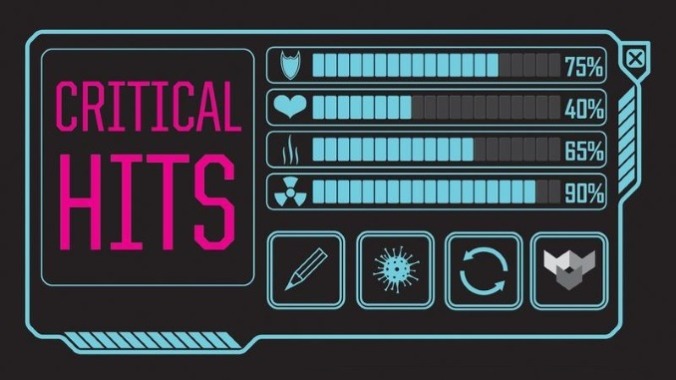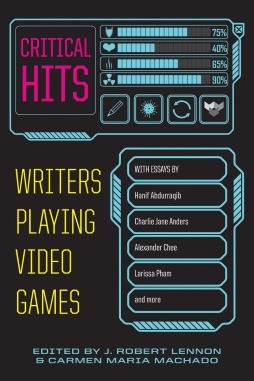Essay Anthology Critical Hits Is a Dull Rehash that Fails to Engage with Games Criticism
Images adapted from the cover to Critical Hits Games Features critical hits
In the introduction to the videogame essay anthology Critical Hits, co-editor Carmen Maria Machado claims that it is “the first of its kind, as far as I and my co-editor can tell.” She and the other co-editor J. Robert Lennon made similar assertions in a November 2023 interview with Electric Literature. Shortly thereafter, social media was afire with writers who are in the same spot I am, who have been writing literary-minded essays about videogames for years, if not decades. It is frustrating to feel unrecognized. However, Critical Hits’ fundamental problem is not that it doesn’t show deference, but that it doesn’t learn lessons from game criticism’s checkered past. It recreates its numerous failures and foibles. Scroll Critical Distance on any given Sunday and you’ll find essays like these. The primary difference is whoever wrote those was paid less.
That isn’t to say that Critical Hits’ ignorance doesn’t sting. The only way it is the only book of its kind is if its editors only looked at traditional presses, leaving out academia and the internet, among other avenues. (It’s also an absurd thing to say when your book has a Tom Bissell pull-quote on the back. The primary difference between this and Extra Lives is that this is an anthology). Independent presses like Lost In Cult and Boss Fight Books, as well as outlets like Paste and Unwinnable, have been putting in this work for a long time. Unwinnable even has a compilation called, you guessed it, Critical Hits. This work has been done before. By definition Critical Hits is not “novel.” This observation, though, does not offer any real insight into Critical Hits as a text.
So, let’s do it. A physical book with some popular literary names attached grants two things, for better and worse: space and legitimacy. The book doesn’t leverage either. Though only three of the 18 entries were published online before the collection, most read like newsletters and web essays. A literary book on videogames and the anthology format promises variety, but most of Critical Hits is in the same basic genre. Where are videogame poems, written Let’s Plays, simulated forum chats, fiction, and fanfiction? A book like this, about play, is an opportunity for play. Critical Hits mostly squanders that. The brief steps away from the formula are consistent highlights. MariNaomi’s brief graphic memoir is a welcome change of pace and the poetic “Mule Milk,” by Keith S. Wilson, offers some of the most evocative passages in the collection (though it would possibly be better if it didn’t talk about videogames at all).
Instead of stepping into its space with confidence, much of Critical Hits feels the need to justify itself. In one absurd page in the introduction, Machado lists all the videogames she’s played in recent years. It’s the same appeal to authority as that picture of Anita Sarkeesian with all those plastic cases. The kind of “gamer” Machado addresses here will doubt her authority no matter how many games she lists. For everyone else, it’s tiresome to read.
In other examples, one essay, “Clash Rules Everything Around Me” by Tony Tulathimutte, calls out games journalism’s self-consciousness, but then makes a broadside defense for the virtues of free-to-play games. This is an unconscionable and well-worn genre of essay. In “The Great Indoorsmen,” Eleanor Henderson contemplates her kids’ ravenous and joyful relationship with videogames in an essay that reminded me of gamer dad blogs and this write-up in The New Yorker. Neither of these essays lack profundity and I could imagine them impacting the right reader. But they do lack dialogue. Am I wasting my life or am I raising my kids well are broad, relevant questions that don’t need original answers. However, these essays would benefit from engaging with writers who came before, even in the narrow, niche realm of videogames criticism.

This is a consistent problem throughout the book. Only some essays are interweaving and dialectical, much of them seem sectioned off from the work of other writers. Even the parts that do engage outside texts tend to leave out other writings about videogames (“I Was A Teenage Transgender Supersoldier” by nat steele is a notable exception). This is not all bad. I too would rather read Fanon than essentially all of games criticism, but it does make the essays feel lonely. I know that every one of these writings would benefit with real engagement, even passionate disagreement, with other writers writing about this same material. It’s frustrating to see the opportunity for further depth skimmed over without even a backward glance.
That might just be a genre issue. There’s not actually THAT much criticism in this book. Most entries are personal essays or nostalgic retrospectives. The first truly critical essay in the book is “Cathartic Warfare” by Jamil Jan Kochai, the seventh entry from the front cover. It’s also one of the strongest essays, a sharp analysis of Call of Duty’s depiction of the “war on terror” and white catharsis.
The book’s best essays tend to lean on criticism. For example, “In The Shadow Of The Wolf” by Vanessa Villarreal is the kind of sprawling and multifaceted essay that the current environment makes difficult to find (and even harder to write). It treads well-trodden ground and it would have benefited from more rigorous citations, but an essay doesn’t have to be original, only insightful. It hops between Lord of the Rings, Assassin’s Creed, and Dragon Age to build a complex, affectionate, and condemning picture of videogames’ incorporation of Nordic myth. Here the personal aids the critical, rather than the other way round. Villarreal leverages her personal resonance with Dragon Age: Inquisition in an effort to chart the game’s themes directly. Her relationship to the game clarifies her insights, rather than dilutes them.
While both these essays are paranoid in construction, they also avoid the most fundamental edges of videogames’ power: their broader relationship with military tech and extraction from the global south. Videogames are, to quote Meghna Jayanth, the highest form of capitalist art. As they are, they cannot exist without environmental destruction, displacement, and extraction. No essay in the book discusses this and only one mentions it, uncritically, in passing.
The games chosen are also mostly recent and high-budget. The exceptions are independent mega-hits like Hollow Knight and canonical retro games. A book like this is an opportunity to shed some light on lesser-known works and place them alongside well worn classics like Metal Gear Solid or modern darlings like Red Dead Redemption 2. It’s an opportunity to evangelize. Most of the games covered here have had passionate defenses or sincere coverage. It would be nice if at least a few were new to me.
Admittedly, I like to read and write about small games and systemic material conditions. But they are also values I hold of how we should write about videogames. The ideological structures of videogames demand a principled paranoia that few serious contemplations of the medium have managed. The sheer amount of strange, wonderful work being done by outsider and marginalized artists is enough to make any critic’s heart sing. The book’s form demands that it mostly write about what is known and what is powerful. God forbid we stop writing about The Last of Us. Like much of online games criticism, Critical Hits‘ evangelical stance dulls its teeth and blurs its sight.
All in all though, Critical Hits is a pretty accurate picture of how games criticism works now. In their essay on the aforementioned interview, Gita Jackson writes, “it’s infuriating to read, like I’m watching these two writers come into my apartment and put their muddy shoes on all the furniture. Where were you for all those years, when the merits of writing about games in this exact way were being debated day in and day out?” This frames the book (by extension) as an intrusion. I understand this feeling, but I disagree. These writers don’t dirty the room, it’s already falling apart. This collection doesn’t hurt anything; it is more evidence of what we already knew. Everything frustrating about this book can be found on almost every videogame website in existence. None of us are talking to each other. There are a lot of reasons for this, and some of them are even good, but goddamn, it is sad.
Grace Benfell is a queer woman, critic, and aspiring fan fiction author. She writes on her blog Grace in the Machine and can be found @grace_machine on Twitter.